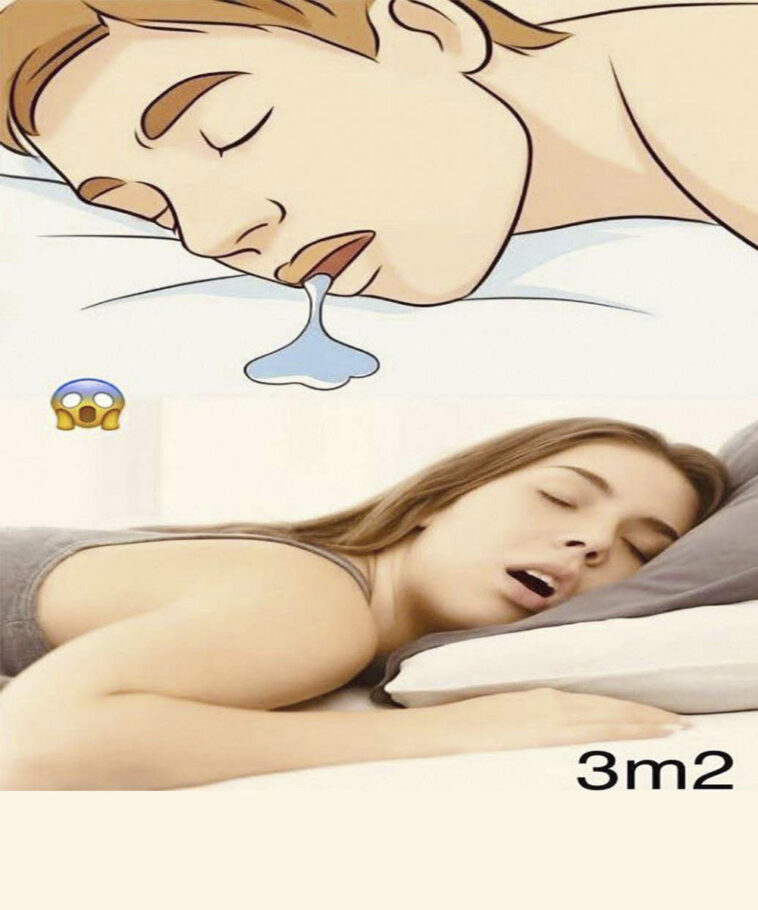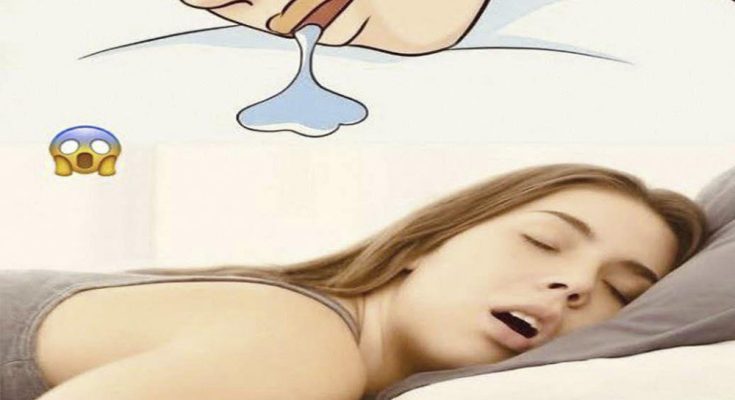
The Moment You Wake Up to a Wet Pillow
You open your eyes, stretch, and realize your pillow is damp. Instinctively, you wipe your cheek, maybe even feel a twinge of embarrassment. But before you rush to change your pillowcase, pause for a second—because what your brain is doing while you drool is actually fascinating.
Drooling during sleep isn’t a sign of poor hygiene or laziness. It’s a reflection of complex neurological and physiological coordination happening deep inside your brain. Known medically as nocturnal sialorrhea, this everyday event offers an intriguing look into how your body maintains vital balance—even while you’re unconscious.
Why Drooling Happens: The Brain’s Night Shift
Throughout the day, your brain maintains constant communication with your salivary glands. It adjusts saliva production based on what you eat, drink, and even how much you talk. Every time you swallow—something you do unconsciously hundreds of times a day—your brain is sending micro-signals to keep your mouth moist but not overflowing.
At night, that balance shifts. The brain slows down voluntary muscle activity while maintaining core life functions like breathing, digestion, and cellular repair. During this phase, the muscles around your mouth and jaw relax, and swallowing reflexes decrease. When saliva continues to be produced, it naturally collects until gravity takes over.
The result? A tiny, harmless pool of drool escaping onto your pillow.
The Role of Sleep Phases: REM vs. Non-REM
Not all stages of sleep are created equal. The human sleep cycle alternates between non-REM (deep restorative sleep) and REM (rapid eye movement) stages—each influencing drooling in different ways.
During non-REM sleep, muscle tone decreases slightly, and saliva production slows. However, during REM sleep—the stage where vivid dreams occur—muscle relaxation is at its peak. The body essentially “paralyzes” voluntary muscles to prevent acting out dreams, but your salivary glands don’t shut down.
Your brain continues to manage internal balance, but the communication between muscles and glands isn’t as tight. Saliva builds up, and without active swallowing, it finds an escape route. That’s why you may wake up from a dream and notice your pillow is damp—it’s your brain’s autopilot system working behind the scenes.
How Body Position Influences Drooling
Believe it or not, your sleeping position has as much impact on drooling as your brain does.
-
Sleeping on your stomach or side: Gravity encourages saliva to flow toward the edge of your mouth, making it easier for drool to escape.
-
Sleeping on your back: This position helps saliva naturally drain toward your throat, reducing leakage—but sometimes increases snoring or mild sleep apnea.
If you’re trying to reduce nighttime drooling, health specialists often recommend adjusting to a back-sleeping posture and using a pillow that supports neck alignment. This not only limits drooling but can also improve respiratory health and spinal balance, key factors that affect sleep quality and even insurance assessments for sleep disorders.
When Drooling Reflects a Health Issue
In most cases, drooling is harmless. However, excessive nighttime drooling can sometimes signal underlying medical or dental conditions that deserve attention.
Possible contributors include:
-
Nasal congestion or allergies: When you can’t breathe through your nose, your mouth naturally opens, increasing saliva leakage.
-
Sleep apnea or respiratory issues: Interrupted breathing patterns alter muscle control.
-
Neurological disorders: Conditions like Parkinson’s disease, ALS, or post-stroke effects may interfere with swallowing reflexes.
-
Dental misalignment or dentures: Poor bite structure or ill-fitting dental work can disrupt normal saliva flow.
-
Medication side effects: Some antidepressants, sedatives, and allergy medications impact salivation control.
If drooling suddenly increases or occurs alongside other symptoms—like choking, coughing, or difficulty swallowing—it’s wise to consult a medical professional or neurologist. Under most health insurance plans, sleep or dental evaluations are partially covered, especially when related to airway function or muscle disorders.
The Stress Connection: How Emotions Affect Saliva
Stress and anxiety might not seem related to drooling, but they quietly influence your sleep cycles. When you’re stressed, your sympathetic nervous system—the body’s “fight or flight” response—interferes with normal muscle relaxation.
This imbalance often leads to restless sleep, jaw tension, and irregular saliva production. Ironically, once the tension breaks and your muscles finally relax, saliva control drops off completely. That’s why stress-related drooling often follows nights of exhaustion or emotional burnout.
Experts in behavioral health and sleep medicine suggest stress management techniques—like mindfulness, hydration, and avoiding caffeine late in the day—to stabilize nighttime function.
The Role of Diet and Hydration
Your last meal or drink before bed can directly affect whether you wake up with a wet pillow.
-
Spicy and salty foods stimulate saliva glands long after you’ve stopped eating.
-
Dehydration thickens saliva, making it harder to swallow efficiently.
-
Alcohol and tobacco both interfere with muscle tone and saliva regulation.
For optimal balance, nutritionists recommend drinking about 8 cups (1.9 liters) of water per day and avoiding heavy, flavorful dinners right before bedtime. This supports both saliva consistency and metabolic health, a key factor for people managing chronic conditions like diabetes or hypertension.
Drooling in Children vs. Adults
For children, drooling during sleep—or even while awake—is perfectly normal. Their neurological and muscular systems are still learning coordination, especially around swallowing.
In adults, however, drooling patterns reveal more about internal health. For instance, jaw structure changes, tooth wear, or sleep posture can alter saliva dynamics. Dentists often use nighttime drooling as a subtle indicator of temporomandibular joint (TMJ) tension or airway resistance.
Interestingly, orthodontic corrections or custom night guards can help reduce drooling while also preventing tooth grinding (bruxism)—a habit linked to both stress and sleep apnea.
The Positive Side of Drooling
Before you try to “fix” your drooling completely, it’s important to remember that saliva is essential for your body’s health.
-
It protects tooth enamel from bacteria.
-
It aids digestion by breaking down food before it reaches the stomach.
-
It maintains mouth hydration and prevents gum disease.
In other words, if you’re drooling, your brain is doing its job right—keeping your salivary system active and protective even when you’re unconscious. From a medical and dental health standpoint, this is a good sign of functional balance.
Simple Tips to Reduce Nighttime Drooling
If you’d still prefer to wake up with a dry pillow, here are some expert-backed solutions:
-
Change your sleeping position – Try sleeping on your back with a supportive pillow.
-
Treat nasal congestion – Saline sprays or antihistamines (as prescribed) help restore nasal breathing.
-
Stay hydrated – Proper hydration improves saliva viscosity and swallowing.
-
Avoid alcohol or heavy meals before bed – Both reduce muscle coordination.
-
Visit your dentist – Misaligned teeth or dentures often contribute to nighttime drool.
-
Consult a sleep specialist – Persistent drooling could indicate mild sleep apnea or other treatable disorders.
With proper care—often covered under preventive health or dental insurance plans—you can significantly reduce unwanted drooling and improve overall sleep quality.
A Deeper Look: The Brain’s Hidden Coordination
Perhaps the most remarkable part of this whole process is what it reveals about your brain. Even while you sleep, your brain is actively monitoring, adjusting, and maintaining vital systems: heartbeat, breathing rhythm, hormonal balance, and digestion.
Drooling, then, becomes a quiet sign that the brainstem’s autonomic network is doing exactly what evolution designed it to do—keeping you alive and well, without requiring your conscious input.
Every droplet of saliva represents a successful message passed from your nervous system to your glands, a microscopic collaboration in the orchestra of rest and recovery.
What Science Says About Sleep and Brain Health
Recent research from neurology and sleep medicine journals reveals that the brain’s glymphatic system—the network responsible for flushing out toxins—works best during deep sleep. This system clears away waste proteins linked to memory decline and cognitive disorders like Alzheimer’s disease.
In this context, proper saliva flow and muscle relaxation are part of a broader chain reaction that helps your brain detoxify and restore itself nightly. Drooling, while simple on the surface, connects directly to this internal cleansing process—just one more example of how your body silently heals.
When to See a Professional
Occasional drooling is natural. However, you should consult your doctor or dentist if you experience:
-
Consistent heavy drooling every night
-
Difficulty swallowing during the day
-
Facial numbness or weakness
-
Sudden onset after taking new medication
-
Disrupted sleep due to saliva accumulation
A professional can determine whether it’s simply nocturnal sialorrhea or a more specific condition. Under many health and dental insurance policies, evaluations for sleep-related oral issues are partially reimbursed—so addressing the issue early can save both discomfort and cost.
The Hidden Lesson in a Simple Reflex
Drooling may not be glamorous, but it’s a gentle reminder of how beautifully coordinated your body and brain are. Every reflex, every cycle, every adjustment happens without conscious effort, keeping you balanced through the night.
So the next time you wake up to a damp pillow, take a second to appreciate the quiet complexity of what just happened.
Your brain has been at work, restoring, repairing, recalibrating—making sure your health, sleep quality, and nervous system stay aligned.
